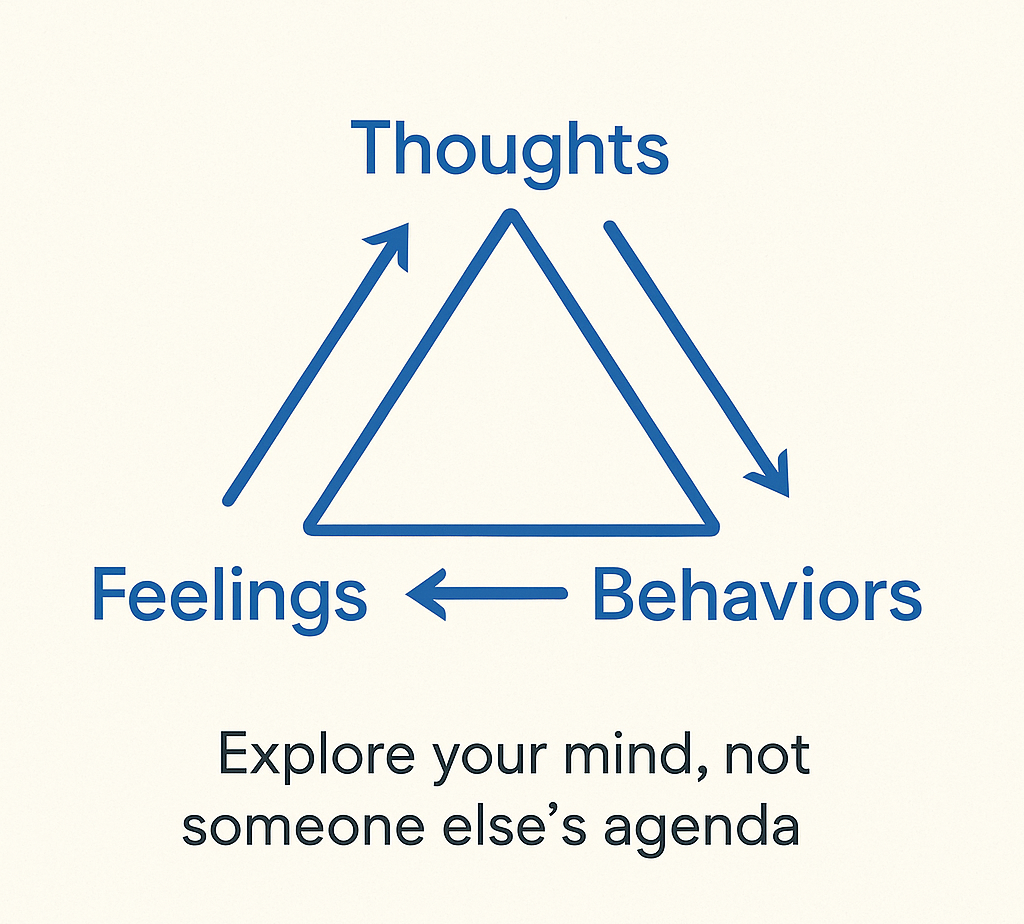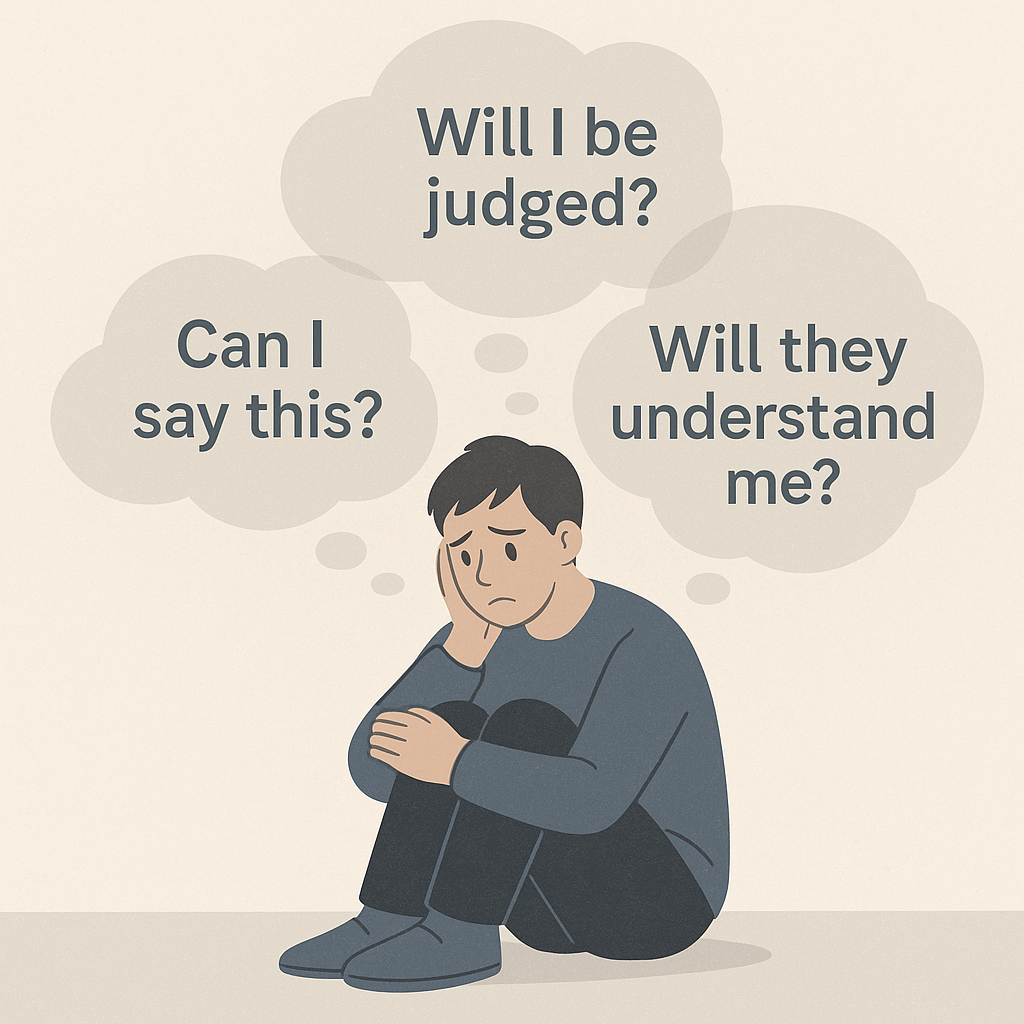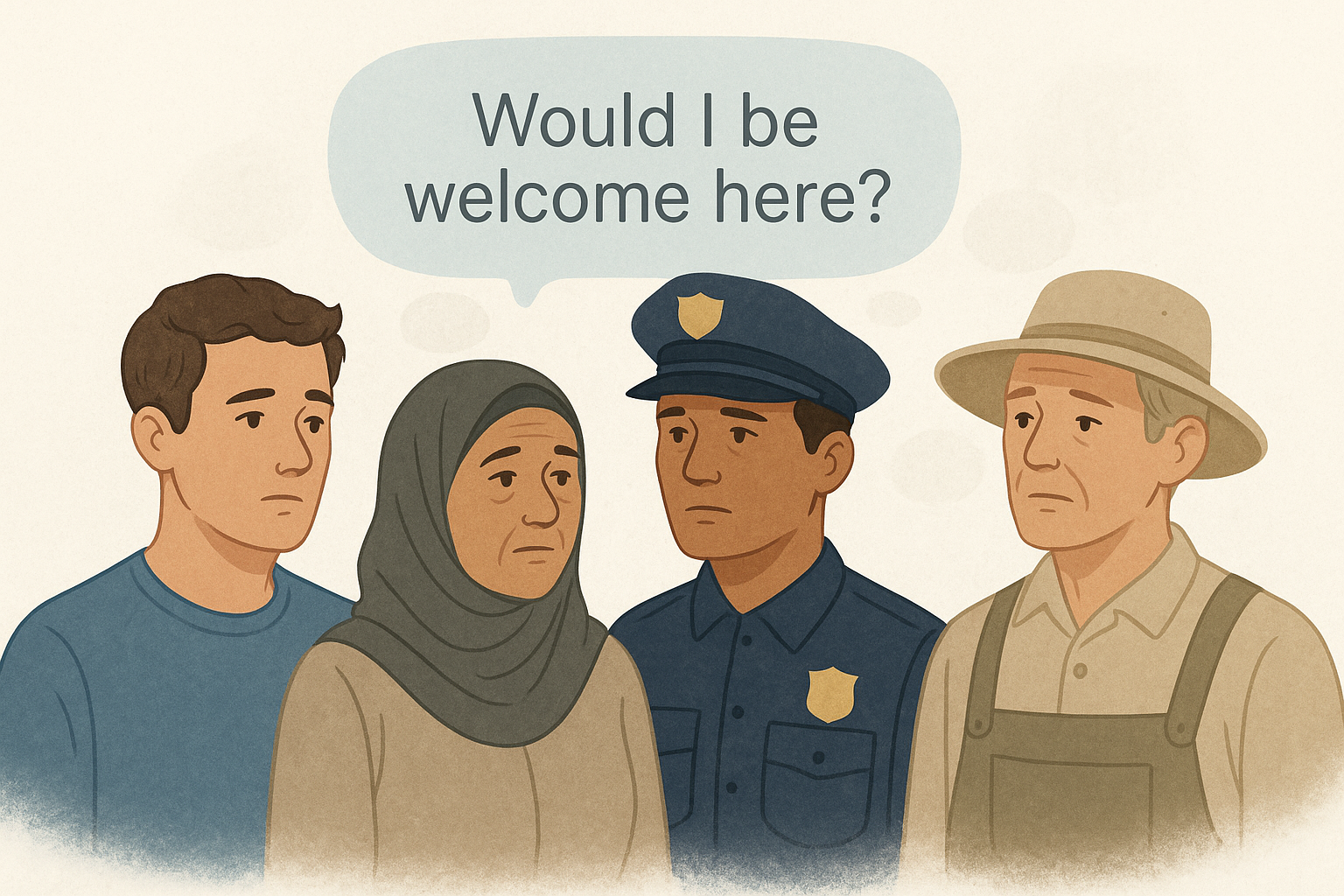Therapy Without Politics: Why Mental Health Support Should Be Unbiased

In recent years, more and more people have started asking a simple but important question: Can I talk to a therapist without feeling judged?
For some, the hesitation comes from past experiences where therapy felt more like a political discussion than a place to heal. For others, it’s a quiet worry, What if I say the wrong thing? What if my therapist assumes what I believe? What if I don’t use the right words and get labeled instead of understood?
Mental health support should never feel like walking on eggshells. It should be a space where you can show up exactly as you are, messy, confused, hurt, uncertain and be met with curiosity, not correction.
At its core, therapy is supposed to help you understand your thoughts, not reshape your beliefs. It’s meant to give you tools to feel better, not a script to follow.
In this article, we’ll explore why some people feel therapy has become politicized, what truly unbiased therapy looks like, and why your mental health support should be about you, not someone else’s ideology.
Because healing shouldn’t require passing a test.
Is Therapy Becoming Political?
If you’ve ever hesitated to seek therapy because you were worried it might come with a side of judgment, you’re not alone.
In today’s hyper-polarized world, even mental health, something that should feel deeply personal and safe, can feel like it’s caught in the crossfire. Whether it’s language that feels ideological, assumptions made based on identity, or therapy frameworks that lean into activist or political narratives, some people perceive therapy as a place to be corrected instead of supported.
You may have heard:
- “My therapist was more focused on labels than listening.”
- “I felt like I couldn’t share my honest feelings without being told they were problematic.”
- “I stopped going, I felt misunderstood and boxed in.”
Even perception matters. If someone feels they have to filter their words or hide their values, they’re far less likely to open up at all.
In fact, the American Psychological Association’s 2023 "Stress in America" survey found that 68% of Americans say politics are a significant source of stress, and 57% are specifically stressed by the current political climate. When stress from politics becomes overwhelming, it can carry over into deeply personal spaces including therapy making people fear that sharing their thoughts might backfire.
It doesn’t help that therapy has become more visible online, especially through platforms like TikTok and Instagram. While well-meaning, much of the content can feel narrowly framed by certain cultural or political narratives, which can alienate those who don’t identify with them. Therapy starts to look like a club you have to join rather than a place that welcomes everyone.
But mental health isn’t partisan. Feeling anxious, numb, angry, or overwhelmed doesn’t belong to one side of the political spectrum. And therapy shouldn’t either.
What people are really asking for is simple: A space to feel heard, not handled.
What Unbiased Therapy Really Means
Let’s clear something up, unbiased therapy doesn’t mean therapy that ignores who you are. It means therapy that doesn’t assume who you are.
There’s a difference.
Good therapy should absolutely take into account your background, identity, values, and life experiences but it should never push beliefs on you, steer you toward certain worldviews, or make you feel like you need to use the “right” language to be understood.
At its core, unbiased therapy is about respect.
- Respect for your beliefs
- Respect for your emotional process
- Respect for the fact that healing is not one-size-fits-all
Many therapists strive to practice this way. But in a cultural moment where some therapeutic spaces are adopting more activist language and frameworks, some clients have started to wonder if therapy is still neutral ground.
That’s why evidence-based approaches like Cognitive Behavioral Therapy (CBT) remain so valuable. CBT isn’t built on ideology, it’s built on how thoughts, emotions, and behaviors interact. It teaches you to observe your thinking patterns, notice distortions, and make small, meaningful shifts that can improve your mood and your life.
It doesn’t tell you what to think. It helps you examine how you think.
🧠 Example CBT tools include:
- Identifying automatic negative thoughts
- Recognizing cognitive distortions like catastrophizing or black-and-white thinking
- Building healthier coping strategies for stress, anxiety, or depression
And the best part? These tools work whether you’re liberal or conservative, religious or secular, neurodiverse or neurotypical. Your beliefs don’t disqualify you from healing.

In truly unbiased therapy, you lead the way. The therapist (or therapeutic tool) simply helps you understand what’s going on inside, without inserting judgment or ideology. That’s not just effective. It’s essential.
Why Judgment-Free Therapy Is Essential for Healing
For therapy to work, one thing has to be true from the very beginning: you have to feel safe enough to be honest.
That doesn’t mean comfortable all the time, therapy is often uncomfortable, especially when you’re confronting patterns or pain you’ve avoided. But it should never feel like you’re being watched for the “right” opinions or graded for how socially aware your language is.
Judgment, even subtle, shuts people down and when people shut down in therapy, they stop healing.
Many people who’ve tried therapy and walked away didn’t do so because they didn’t want help. They did it because the space didn’t feel emotionally safe. Maybe they were corrected in the middle of sharing something vulnerable. Maybe their therapist made assumptions about their values. Maybe they left feeling more confused, more cautious, or more alone than before.
Here’s what real judgment-free therapy looks like:
- You say what’s on your mind, even if it’s messy or uncertain.
- You explore uncomfortable feelings like anger, shame, fear, or grief without being told they’re “bad.”
- You’re not expected to align with any political, spiritual, or cultural belief system to be taken seriously.
A truly helpful therapist meets you where you are. That’s not just about compassion, it’s backed by research.
A 2018 meta-analysis in Psychotherapy Research found that “therapeutic alliance”, the feeling of trust and connection between client and therapist, is the single strongest predictor of positive outcomes across all therapy types. That alliance falls apart the moment judgment enters the room.
This is especially important for people who already feel on the outside of cultural norms, men who’ve been told not to cry, religious clients who feel misunderstood, neurodivergent people who struggle to explain how they think. The moment someone feels judged, they stop bringing their full self to therapy.
Healing takes honesty and honesty takes safety.

Who Gets Left Out When Therapy Feels Political
Therapy is supposed to be for everyone but when it starts to feel political, certain people quietly slip out the door.
It’s not always dramatic. Sometimes it’s a no-show after the first session. Sometimes it’s a polite, “Thanks, this isn’t for me.” Sometimes it’s just a growing distance between the therapist and the person who no longer feels seen.
So who’s getting left behind?
- Men, who’ve been told they should be strong and self-reliant, may already be reluctant to open up. Add in a therapeutic space that uses language they don’t relate to, and they might never come back.
- Religious clients, especially those from conservative or traditional backgrounds, may fear being pathologized for their faith.
- Veterans, police officers, or first responders may feel that certain therapy spaces carry cultural assumptions about their profession or values.
- Politically moderate or right-leaning clients might assume, based on online therapist content, that they won’t be respected or understood.
In a 2022 report from the American Institute of Stress, nearly half of participants said they avoid mental health services not because they doubt their value but because they feel the spaces aren’t built for people like them.
This isn’t just about politics. It’s about cultural fit. Language matters. Tone matters. Feeling like you have to “perform” a certain identity in the therapy room makes it hard to be real and realness is where healing happens.
Some clients feel like they need to preface every sentence with:
"I know this might not sound right, but..."
or
"I’m not trying to be offensive, but here’s how I really feel..."
That’s not therapy. That’s self-censorship under pressure.
Everyone deserves a place where they don’t have to explain themselves just to be understood. A place where they can talk through doubt, anger, shame, confusion — without being labeled or corrected.

How We Bring Therapy Back to the Individual
So how do we fix this? How do we make therapy feel safe again for everyone?
It starts by returning to the foundation of what therapy is supposed to be: a space for you. Not a lecture. Not a re-education. Not a box you’re expected to fit into. Just a place where your thoughts, feelings, and questions are met with curiosity instead of correction.
In practical terms, that means:
- Listening more than labeling
- Asking, not assuming
- Meeting people where they are not where a framework says they “should” be
Therapy doesn’t need to mirror social movements or cultural debates. In fact, it’s often more powerful when it doesn’t. When it’s quiet. When it’s personal. When it stays centered on your emotional world, not the headlines.
That’s where evidence-based tools like CBT (Cognitive Behavioral Therapy) shine. CBT isn’t about telling you how to think, it helps you understand how you think. It gives you a structure to explore your automatic thoughts, emotional triggers, and behaviors, and then gently guides you toward more balanced thinking.
At Aitherapy, we’ve designed our AI to follow that same principle. It doesn’t make assumptions. It doesn’t steer the conversation. It simply asks reflective questions rooted in CBT so you can hear yourself more clearly.
No agenda. No moralizing. No politics. Just a quiet space to process what’s going on in your mind.
We don’t believe you should need to “qualify” for mental health support by aligning with a certain set of beliefs. Your pain doesn’t have a political party. And your healing shouldn’t either.
Ready to talk without fear of judgment?
Why This Matters Now More Than Ever
We’re living in a time where everything feels like it comes with a side of conflict.
Scroll through social media. Turn on the news. Even conversations with friends or family can feel like navigating a minefield.
The result? More people than ever are dealing with stress, anxiety, and emotional exhaustion but fewer feel safe talking about it. That’s a dangerous gap.
That’s why this conversation matters so much right now.
We don’t need therapy that tells people how to think.
We need therapy that helps people figure out what they’re really feeling.
We need therapy that makes room for uncertainty.
We need therapy that works for everyone not just those fluent in the latest trends or frameworks.
This doesn’t mean ignoring injustice or pretending identity doesn’t matter. It means letting the person lead the conversation not politics.
At Aitherapy, we created a space that honors that simplicity. No sign-up, no pressure, no expectations. Just evidence-based questions rooted in CBT, available instantly, 24/7, whenever you’re ready to talk.
Because healing happens in honest moments and honesty only happens when people feel safe.
Aitherapy: Support That Puts You First, Not Politics
Therapy isn’t supposed to be another performance. It’s not a space where you have to speak perfectly, think “correctly,” or agree with anyone to be taken seriously.
It’s supposed to be a space where you can be uncertain. Messy. Honest.
Where you can say the thing you’ve been afraid to say out loud and not be punished for it.
But in a world where even help can feel politicized, more and more people are staying silent. Carrying the weight alone. Believing their pain isn’t valid unless it fits a certain narrative. That’s not just sad. It’s dangerous.
Mental health support should belong to everyone because depression doesn’t care how you vote. Anxiety doesn’t ask how “correct” your language is. Burnout doesn’t discriminate. And healing, real, personal healing, only happens when people feel safe.
We built Aitherapy for that reason. To offer a space where anyone from any background, belief, or identity can start talking without pressure. Without judgment. Without politics.





